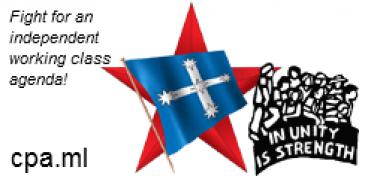Workers' Struggle Goes Well Beyond "Protected Industrial Action"
Written by: Ned K. on 27 September2024
Hardly a day goes by without workers somewhere in Australia taking "protected industrial action" to win unresolved claims from Enterprise Agreement negotiations with their immediate employer.
Workers who are union members continue to use the "protected industrial action" provisions of the Fair Work Act to protect and/or advance their incomes and working conditions. Use of these provisions has led to some workers taking collective industrial action for the first time against a single employer across different worksites.
A current example of this is warehouse workers employed by German multinational logistics company DHL.
These workers are taking rolling strike action in pursuit of wage increases of up to 10% per year just to catch up to average wages in warehousing enterprise agreements. Workers in the iron ore and coal mining industries in WA and Queensland are using the new multi-employer bargaining provisions of the Fair Work Act to increase wages across large sections of these industries. The big multinational mining companies are desperate to prevent these workers from uniting across their industry.
Eventually these types of struggles around new enterprise agreements are resolved. Sometimes the workers win all their industrial demands in full, sometimes in part.
However, the longer-term win for thousands of workers who have union enterprise agreements is that the agreements often contain clauses which increase their capacity to remain organized through the whole life of their enterprise agreements. Many agreements now contain clauses that force the boss to recognize workers' elected representatives and provide paid time meetings of union members and paid time union induction meetings with new starters.
Workers have also won clauses in agreements that require the boss to maintain the status quo if there is any workplace issue in dispute. The better organization on the job that workers maintain during the life of an enterprise agreement, the less chance of the boss clawing back workers’ hard won gains.
These organizing rights clauses that workers win in agreements are important to frustrate the boss's attempts to disorganize workers during the life of an agreement.
The Fair Work Act does not allow workers to legally take industrial action during the life of an agreement. The Act protects the boss from workers' industrial action for all but the limited bargaining period for a new agreement.
For example, no matter what the industry, many bosses who are forced to agree to higher wage increases in an enterprise agreement, will try and claw back their total labour costs during the life of the agreement by not replacing workers who leave or changing rosters to avoid penalty rates or increasing workloads.
The multinational corporations and other large employers and their governments (Labor or Liberal) are well aware that the current Fair Work Act gives them a dream run of preventing workers’ collective action for nearly the whole cycle of the enterprise agreement process.
A campaign to force the government to scrap the "protected industrial action" provision and replace it in the Fair Work Act with provisions for workers' right to withdraw their labour at any time they deem it necessary is long overdue.
The chances of such a campaign being initiated by the ACTU current leadership are well non-existent for fear of getting too off-side with the current government. Such a campaign will need to be generated by workers themselves.
Print Version - new window Email article
-----
Go back
Independence from Imperialism
People's Rights & Liberties
Community and Environment
Marxism Today
International
Articles
| Boss Class Agenda or an Independent Working Class Agenda? |
| Workers united struggle under re-elected ALP government is needed |
| Workers’ struggle as a class gives life to ACTU's "strength in numbers, power in solidarity, we are unstoppable" |
| Farm Numbers Down - Farm Debt Up |
| Building struggle around an independent working class agenda is the key |
| Labor hire warehouse workers and government support service workers win through struggle |
| Vale Ron Owens |
| Tasmanian potato growers spitting chips |
| Workers are revolting despite restrictions on strike action |
| "Productivity" for workers means job losses and higher workloads |
| Forewarned is forearmed: Economic Reform Roundtable |
| Public sector workers take on SA government |
| Courts uphold government attack on militant union |
| Support BAE shipworkers’ action for same job, same pay |
| Labor Sweeps to Power: Now It’s Time to Deliver for Workers |
| Dystopia and the Sacrosanct Elephant |
| Workers Strike at PepsiCo's Snack Foods Factory - An Example of The Leading Class In Action |
| ALBANESE DEFINES LABOR PARTY - "MAINSTREAM" and "REFORMIST NOT REVOLUTIONARY" |
| May Day Greetings from CPA (M-L) |
| NSW construction workers to march on May 1 |
-----

